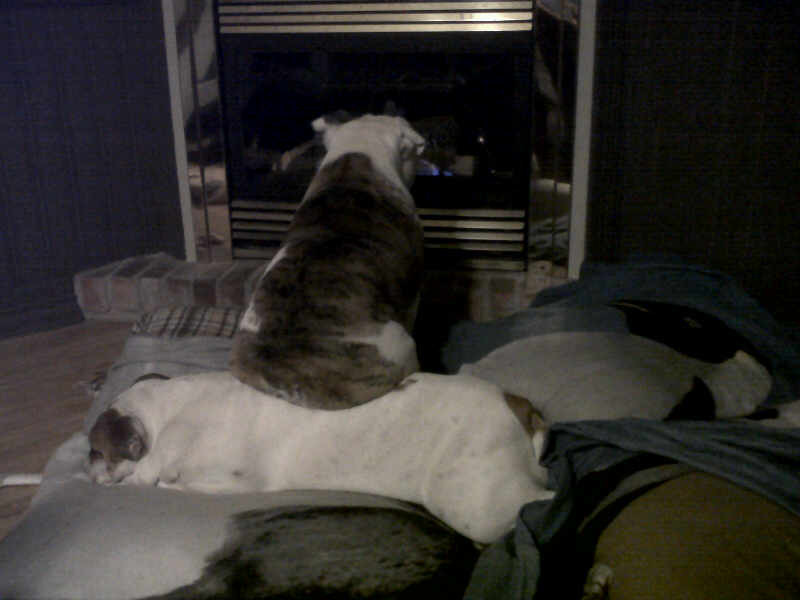
Neuter
Submitted by Karen on July 3, 2012 - 1:00pmI'm sure that this question has been asked many times. My bulldog will be 6 months this month the vet says to neuter him now and the breader wants me to wait until he is 1 yrs says he needs to develope more and reach physical maturity. What shall I do?
__________________


 Karen
Karen


My opinion....
wait!
Here's some reading for you: http://www.gopetsamerica.com/dog-health/spay_neuter_risks_benefits.aspx
Thank you for the
Thank you for the information. This just makes the decision harder. I have 2 female bulldogs both spayed he has started to jump on them and it makes it hard. They really don't like. Now what to do???
Dogs can be taught not to hump...
especially when they're so young. It's not unusual for dogs that are neutered to hump either, so I'd work on the behavior that might continue anyway without training. Good luck in your decision.
An article you might find interesting
The surgical removal of the male and female sexual reproductive organs, primarily the testicles and the ovaries is known as neutering. More specifically neutering male dogs is called castration and spaying when referring to bitches.
Most dog owners’ reach a time when they have to decide whether or not they will have their pet neutered, most vets will recommend this however the age at which they suggest it will vary. There are many health benefits to neutering dog such as eliminating chances of infections such as pyometra and decreasing the risk of getting some cancers. However there is scientific literature which suggests some concerns over neutering such as those discussed in a review by Laura J Sanborn titled “Long-Term Health Risks and Benefits Associated with Spay / Neuter in Dogs” May 2007 which is freely downloadable on the internet. In this review Laura Sanborn concludes to conclude: “An objective reading of the veterinary medical literature reveals a complex situation with respect to the long-term health risks and benefits associated with spay/neuter in dogs. The evidence shows that spay/neuter
correlates with both positive AND adverse health effects in dogs. It also suggests how much we really do not yet understand about this subject.
On balance, it appears that no compelling case can be made for neutering most male dogs to prevent future health problems, especially immature male dogs. The number of health problems associated with neutering may exceed the associated health benefits in most cases.
For female dogs, the situation is more complex. The number of health benefits associated with spaying may exceed the associated health problems in many (not all) cases. On balance, whether spaying improves the odds of overall good health or degrades them probably depends on the age of the dog and the relative risk of various diseases in the different breeds.
The traditional spay/neuter age of six months as well as the modern practice of pediatric spay/neuter appear to predispose dogs to health risks that could otherwise be avoided by waiting until the dog is physically mature, or perhaps in the case of many male dogs, foregoing it altogether unless medically necessary.
The balance of long-term health risks and benefits of spay/neuter will vary from one dog to the next. Breed, age, and gender are variables that must be taken into consideration in conjunction with non-medical factors for each individual dog. Across-the-board recommendations for all dogs do not appear to be supportable from findings in the veterinary medical literature.”
I am not a veterinary surgeon and am not suggesting that you do, or do not neuter your dogs in relation to any veterinary benefits, however you should discuss whether neutering your dog is the right thing for him/her and when the best time to do this would be for your individual dog.
Another reason many owners consider neutering their pet is for the perceived behavioural changes. There is popular believe amongst some people that neutering will reduce or eliminate aggressive and ‘hyperactive’ behaviour in dogs. In my experience this is not generally true. Neutering your pet will result in change to your pets behaviour based on the effects of hormonal changes which will occur following the surgery however these are often different to many peoples perception.
Neutering is likely to result in changes to a dogs behaviour, primarily those which are under hormonal (I use this world in this article to mean chemicals produced and regulated by the reproductive systems which are altered by neutering) stimulation such as some types of humping behaviour, some types of escape and roaming behaviours and possibly some types of aggressive behaviour towards other dogs where it is believed the behaviour is hormonally triggered. However these behaviours will also have a conditioned (learned) component to them especially if they have been practiced for some time. Dogs will also show the behaviours listed above for other reasons; I have seen many dogs humping the owner or people within the house where I believe the behaviour is more related to attention seeking rather than triggered by the dogs ‘sexual desires’. Where this is the case neutering your dog is not likely to deal with the reason the behaviour is happening which could be because the dog does not get enough attention for engaging in more desirable behaviours throughout the day but get the most attention when he or she starts to hump. If the humping is believed to be based on a hormonal motivation then neutering will definitely help and sometimes completely eliminate the behaviour, however there are times when training will also need to be done to address the learned behaviour too.
Neutering dogs that show aggressive behaviour is an area where I believe neutering is use too much as a behaviour modification tool. In some situations I believe it is likely to make the aggressive behaviour worse. If a dog is showing aggressive behaviour towards then you should first consult your vet who will rule out possible veterinary causes then if they feel it is behaviourally related they can refer you to a suitably qualified and experienced behaviourist who can assess your dog to see what they would recommend, this may or may not include referring you back to your vet recommending neutering. One of my concerns in neutering a dog showing aggressive behaviour is if that behaviour is based on anxiety or fear (these are the most common reasons for dogs showing aggressive behaviour from the cases I see). I have seen dogs that the owners have described as “getting worse” after neutering and I believe that this could happen as the hormones which would partly provide ‘confidence’ to the dog in these situations are removed so the dog is in a heightened state of anxiety / fear. Where an owner wants to neuter their dog and where the dog already shows aggressive behaviour that I do not feel is driven or influenced negatively by hormones I will work the dog and owner through the problem behavioural areas first before suggesting they neuter.
I also have a similar concern where dogs that show fear related behaviours especially towards other dogs and people being neutered before the dog has learnt appropriate coping strategies and the owner is competent in understating their dogs behaviour and how to support their dog in these situations. A suitably qualified and experienced behaviourist such as a member of the Association of Pet Behaviour Counsellors (www.apbc.org.uk) would be able to provide this help.
I believe the age at which a dog is neutered is also important; In the UK vets often suggest dogs are neutered around 6 months and both pre and post season when the dog is a bitch. In many parts of America neutering is happening when dogs are young as 12 weeks old. I personally believe dogs are individuals like people in terms of their psychological and physical development and for this reason I do not believe that all dogs should be neutered at a pre-set age regardless of their behaviour at the time of neutering. I definitely believe that 12 weeks is far too young and there are questions / concerns in the scientific literature regarding bone development in dog neutered this early. Dogs also go through various developmental phases, which include what is popularly known as ‘fear periods’; it is believed that dogs will go through two of these ‘fear periods’ during their development from a puppy to an adult. One will be around 8-14 weeks and other between 6-14 months, the are range is so wide because different dogs will develop and experience these sensitive periods at different times, smaller dogs are likely to mature sooner and bigger dogs much later. If you intend to neuter your dog I would suggest that you base the age on your individual dog and ensure that your dog is not going through a sensitive phase at that time. If in doubt delay! Often owners notice their dogs behaviour change temporarily, the dog may show a ‘bizarre’ hesitation of something they may have previously been fine with or seem more sensitive to the novel sights and sounds. I personally like to wait until my dog is showing signs of physical and behavioural maturity such as cock of his leg if he is a male. With bitches I personally like to wait until she has had at least one season, however this does require some management when she is having her season and she could have the potential to have a false pregnancy. In some cases waiting until after a second season can also be beneficial for her development, again this is my opinion not fact. I believe that bitches should be neutered if you do not intent to breed from them because I feel that the risk assessment is otherwise too high in the favour of her getting an unwanted condition. I do not believe that there will be a negative impact on your bitch’s behaviour in general if neutered at the best time for her. It is not true that it is kinder to allow your bitch to have a litter first before you neuter her, breeding dogs should not be taken lightly as there are too many dogs in rehoming shelters already. In 2011 the Blue Cross saw a 27 per cent increase in stray or abandoned animals visiting them! If you are not going to neuter your bitch or are going to allow her to have a season I would strongly suggest that you keep her away from other dogs until she is fully out of her season or until other dogs stop paying lots of attention to her because I have seen some bitches become less tolerant (even start to growl at, snap at and bite) other dogs after they have experienced lots of invasive sniffing and being pestered just before, during and just as they are coming out of season.
With male dogs I would neuter if they showed increased signs of sexually related behaviour such as humping, roaming, redirected aggressive behaviour which is hormonally driven / influenced or increased frustration resulting from the motivation to engage in sexual behaviour. However if I have a male dog that does not show these signs then I am likely to keep them entire and only neuter if the need arises. It could be argued that neutering makes it easier to manage the dog in terms of them being less distracted and so more likely to be responsive to the owner; however again in my opinion this is what training classes are for (if you are looking for a training class ask yoru vets for a recommendation or visit the website for the Association of Pet Dog Trainers (www.apdt.co.uk). When you have an entire male you do need to be observing interaction with unknown entire male dog when out walking more than your would an interaction with a bitch or neutered male. I also believe that good appropriate socialisation and social skills with other dogs from an early age is crucial if you are going to keep your male dog entire and be meeting lots of other entire male dogs on walks too. If you have an entire male dog who does start to get into fight with other entire males then speak to a behaviourist before it keep happening over and over again until it has a large learned component to it. One of my dogs is entire, I see a difference in his behaviour with other entire males, he is a more tense. Based on Cody’s personality type, predisposition, temperament, socialisation and general learning experiences with other male dogs so far he chooses avoid conflict where as another may get into a fight in the same situation. This may also influence whether you think neutering your dog may be better for him and you than not. Not neutering may mean restricting where you walk and if you live in a low entire male dog density area then this is probably not a problem but if you live in a more highly populated area where there are lots of other entire male dogs you may have to be more selective where you walk and this may mean your dog gets less freedom which for a dog who enjoys free walks this would be a problem.
There is a big move to neuter ‘all’ dogs at a set age. I hope in this article I highlight the two sided though process that should be given when deciding to keep your dog entire or neuter him / her. I believe there is a bigger call for more individualised assessment of dogs, their behaviour, upbringing, sourcing and physical health. This may require an owner, vet and behaviourist working closely together to make the best choice for the dog and his/her environment as a whole.
Lynn King CPDT-KA
Lynn, can you provide link to this article....
I'd like to bookmark so to print when needed. Thanks.
Thank you for all your great
Thank you for all your great advice. I spoke to the vet this morning and she did recommend that we wait until he is 1yr. old. Thanks everyone for the great help.
Go to dogstar daily
they have loads of articles on training/behavior/diet etc.,
Lynn King CPDT-KA
Thanks, Lynn!
Great site--great information!